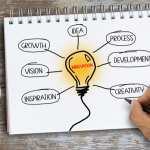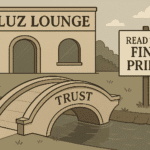As featured in Business World
In our lives, we seek the happiness of sages. We study mindfulness-based on Eastern religions we know are timeless. And we find calm.
Yet, in business, we’re addicted to quick-fix, fast-money gadgets and trends we don’t understand…like cryptocurrencies…run on blockchains. We may profit in the short term, but then we’re baffled when our currency dips and our nervous system jangles like tin cans tied to a dog’s tail.
We might want to ask deeper questions than whether the New Thing will go to the moon. We might want to ask whether the New Thing aligns with our core Truths. If it does, we hold. Or hold.
So, let’s talk about DAOs. And The Dao. (Also spelled Tao.)
Until recently, if someone had asked you about a Dao, you might have told them about The Dao (?) as the Way or the Path. The Dao is balance and flow. The Dao is the Dude from The Big Lebowski, rolling with the punches. I know a lot of Western CEOs with Daoism’s main text, the Dao Te Ching, on their bookshelves or the Tao of Pooh, every human’s primer for the framework of this belief.
Today, if you Google Dao, the first search results aren’t about Yin and Yang. They are about Decentralized Autonomous Organizations or DAOs.
An interesting coincidence.
Now, I know the fact that Dao and DAO are spelled the same is just a fluke. Seeing patterns in unrelated things is a type of magical thinking. And while I may talk fast and own more guitars than I can play well, I’m not crazy.
Mystics tell us that we ignore synchronicities at our peril. In business, “Daoism has something valuable to offer,” writes Po-Keung Ip in “Daoism and Business Ethics,” and “may serve as a counterbalance to … corporate greed, extravagance and excesses, and other forms of corporate malfeasance and corruption.”
When the path of technology maps neatly to the ways of some of the most ancient wisdom, does the striking one-in-a-trillion coincidence that DAOs and The Dao share the name “Dao” stop looking like happenstance and start foreshadowing a cosmic alignment?
And does “I’m a DAOist” make sense as a t-shirt?
Do DAOs offer a path that lets us follow The Dao?
Daoism has organized Eastern civilization for centuries.
In our Western civilization, DAOs are an awesome new way to organize collective action. DAOs use the blockchain technology of cryptocurrencies like Ether, Casper, and Cardano. DAOs differ from old organizations in that they don’t have a typical, hierarchical structure. Decisions are formalized as smart contracts, which are triggered whenever specific criteria are met. We all know Bitcoin may someday become as common as dollar bills. We believe DAOs may become as common for business governance as corporations and nonprofits. DAOs are horizontal, mycelial, and… well… cool.
Let’s see where else DAOs and Daoism intersect.
“Daoist’s try to be like water.
The Dao is the pattern or field underlying existence. All life follows the grooves of the Dao like water on a riverbank. The landscape is an expression of the elemental forces that have shaped it: wind, weather, and time. Water does not fight the Earth. Water flows, slows, inundates, and falls in reaction to the boundaries.
Tech companies, in particular, need to flow like water. Clinging to anachronistic structures is like an icicle trying to stay solid in the summertime, a river trying to flow uphill.
Yes, business evolution has not matched the evolution of the landscape. All too often, we witness human-made inefficiencies injected into organizational structures. Instead of flowing naturally, tasks are directed in arbitrary ways to satisfy piecemeal policies and feed bureaucracy. Wouldn’t it be simpler (and cheaper) to establish the rules, build the landscape, and let the value flow?
Enter DAOs. Company rules are written into the code. You do not flow uphill, you are not metered by executives or hampered by artificial barriers. The workflows naturally, pooling and rushing between the banks formed by the smart contracts that govern the organization. Best of all, rules can morph, what DAOs call dynamic evolutionary governance. If Lao Tzu were a programmer, he’d start a DAO.
” Daoism promotes fairness.
Typical programming reimbursement structures are not fair. Engineers write code and a company owns it, effectively subsidizing executive bonuses.
But with a DAO, compensation is based on value creation. Contributions can be tallied up (transparently and following the rules of the DAO) to create reputation scores. Payouts are based on work, rather than financial contribution. People can do the work that they are best suited for. Participate as much or as little as they want. And the creators and token holders decide what the corporate governance is, instead of eight people aboard. (At least, this is what happens in an ideal DAO. In practice, experts point out, many DAOs only claim to be decentralized. When you look deeper, they model the old hierarchies. Almost none have mastered truly decentralized governance-yet.)
“Daoist’s believe in kindness, modesty, and cooperation.
On DAO message boards, the kindness, modesty, and cooperation are impressive. Developers collaborate on something they own, something which is also greater than themselves. They tend to lack the edgy competition of many programming forums. Sounds like Daoism to me.
Wulf Kaal, law professor, and emerging technology strategist believes DAOs can be both kumbaya and bold at the same time: “DAOs continue to iterate on innovation captured in its community and spin out different DAO structures to capitalize on new ideas and trends identified organically.”
Compared to old structures, Kaal thinks DAOs could make superior decisions: “Centralized systems suck at getting information from the edge. DAOs bring information from the edges continuously. Sub-DAOs with specialists decide on the minutia and report up to the DAO-much more efficient and more judgment proof than a single ‘expert’ making the call without monitoring by the expert community.”
DAO doubts
Of course, questions remain: Can DAOs scale? Navigate the murky waters of commerce?
Gary R. Silverman, a partner in the international law firm White & Case, offers a thought that is Yang to my Yin: “Is modesty really what we want when our business enterprises are competing on a global scale, and where boldness, innovation, and even a touch of audacity-think SpaceX-are needed to drive us forward? Or are we counting on all businesses worldwide becoming benign, humble DAO entities?”
Silverman doubts DAOs will be nimble enough: “I can see designing code to guide an organization in a very simple task. But when it comes to managing a large for-profit organization (Facebook, General Motors, L’Oreal) or even a much smaller one (a corner convenience store), there are a million decisions that are truly judgment calls-what markets to enter, what products to develop, pricing strategies, marketing strategies. How does a DAO do this?”
Why DEVxDAO is crucial
Am I stretching my DAO-Dao comparison too far? Let’s make a bet. We can draw up a Ricardian smart contract that will pay out our bet automatically, without intermediaries.
For our smart contract, though, we’d need infrastructure: a Decentralized App (or DApp). Without DApps, the decentralized revolution stops. Yet finding funding DApps is too often as hard as getting water to flow uphill.
The need for resources for early-stage DApps is one reason I’m thrilled to be supporting the nonprofit DEVxDAO.
DEVxDAO, blessed by its whitepaper, provides technological and community solutions for the evolution of the DAO infrastructure environment. DEVxDAO is giving out tens of millions of dollars in grants to anyone who provides innovative decentralized infrastructure solutions that are open source. Scores of DEVxDAO organizations around the world are already tackling thorny problems in education, tech, energy, the environment, and more.
Like any good idea, DEVxDAO is replicating. It has already spawned five additional DAOs that follow the same internal governance as DEVxDAO.
“This is an evolution of how you run your governance layer to be able to operate more efficiently,” says Timothy Lewis, founder of DEVxDAO.
As my team and I get more involved in the coming months, I’ll say more about DEVxDAO, and how DAOs could be the future of the business structure. Stay tuned.
Until then, meditate and do some tai chi. Remain still in your mind. Don’t worry if you don’t think Daoism and DAOism mesh. Daoism teaches us that everything changes. So we’ll eventually find better structures for our businesses than the DAO. Until then, I’m super happy to have a front-row seat as DEVxDAO helps businesses attain a higher form-in line with the flow of the Dao.
Tony Greenberg is an investor, consultant, impact creator, and advisor to dozens of groundbreaking entities, the founder of RampRate, the top sourcing advisor for IT, and now directs his energies toward fostering projects with transformative potential, including blockchain technologies that democratize access to investment and reduce the potential for corruption.












